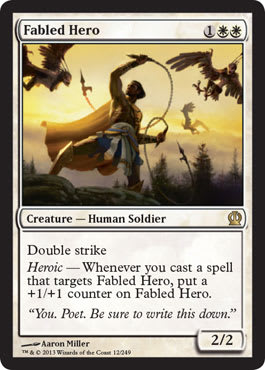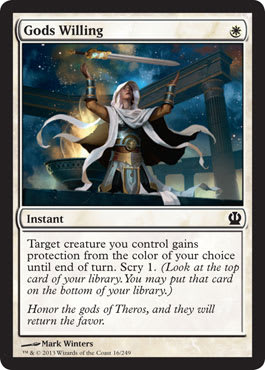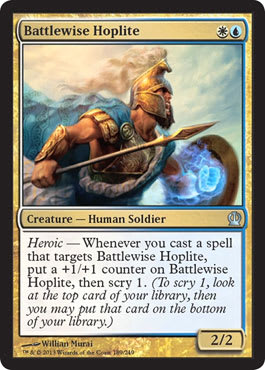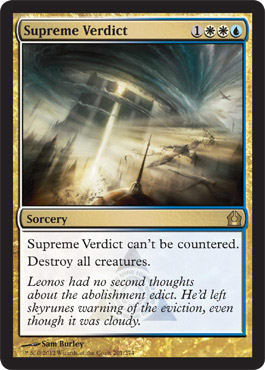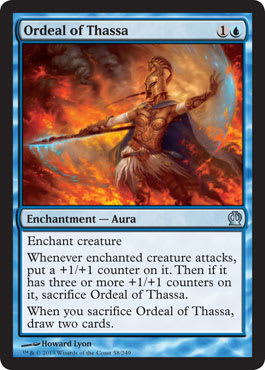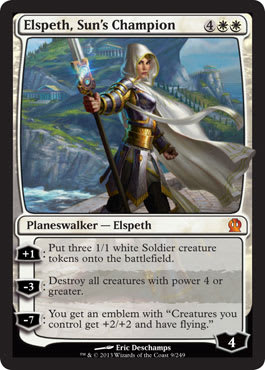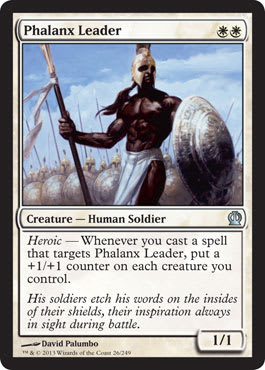Although we're only just going into the new Standard format, Theros has already made a big impact. While monstrosity, bestow, devotion, and scry have all had at least on representative at the top tables, heroic seems suspiciously absent from the best decks. Part of this is probably due to the fact that, unlike the other mechanics, heroic is fairly linear. It wants you to build your deck around it, not just toss it in to any old thing. I previously explored a Boros deck that took advantage of the mechanic, and today, I'll be taking a look at the other color combination that seems well-positioned to use heroic: Azorius.
"W/U Heroes"
- Creatures (26)
- 3 Banisher Priest
- 3 Triton Fortune Hunter
- 4 Battlewise Hoplite
- 4 Fabled Hero
- 4 Favored Hoplite
- 4 Phalanx Leader
- 4 Soldier of the Pantheon
- Spells (11)
- 2 Gods Willing
- 3 Triton Tactics
- 3 Hidden Strings
- 3 Ordeal of Thassa
- Lands (23)
- 11 Plains
- 8 Island
- 4 Azorius Guildgate
The Creatures
Soldier of the Pantheon has quickly proved its usefulness in aggressive decks, ignoring everything from Voice of Resurgence to Detention Sphere and giving you a few points of life at the same time. Although it doesn't have a heroic ability, it's plenty good enough without one.
Favored Hoplite didn't appear in the red version of the deck, but with the higher concentration of heroic enablers in this deck, and especially the six cards that target two creatures at once, having a 1-drop that can take advantage of those is awesome. Casting Ordeal of Thassa on this guy allows you to attack for 3 on turn two and then attack for 4 and draw two cards on turn three. That's a pretty great start for an aggro deck.
Phalanx Leader is the most impressive 2-mana 1/1 I've ever had the pleasure of playing with. Although it's obviously awful if you have nothing to target it with, the upside is big enough to make it more than worth the trouble. Using Hidden Strings to target it twice in one turn will usually give you 4 to 6 extra power for just 2 mana, and as an added bonus, your boosted creatures will now be untapped for blocking.
Battlewise Hoplite has lower variance than Phalanx Leader, starting out as an average 2/2 for 2. It also helps you deal with the inherent variance in Magic by allowing you to scry 1 every time you target it. Whereas Phalanx Leader is something you'll often wait to cast until you can target it, Battlewise Hoplite makes a fine turn-two play on its own.
Fabled Hero bats cleanup in this deck, which is unusual for a creature that only costs 3 mana. Despite its mana cost, however, you'll usually see it attacking for far more damage than your opponent's 4- and 5-mana creatures. Particularly when combined with Phalanx Leader and the dual-target spells, this Hero will often grow large enough to take down the biggest creatures your opponent can throw at it without even breaking a sweat.
Banisher Priest serves as the removal for this deck. Although it has the downside of giving the creature back when it’s killed, it will almost always take a blocker out of your way for a turn. It will also often force your opponent to spend his turn casting a removal spell instead of another threat, putting him behind the pace. Banisher Priest also benefits from Phalanx Leader, which can turn your Gray Ogre into a real threat and put it out of range of burn spells like Magma Jet and Shock.
Triton Fortune Hunter is an interesting experiment I wanted to try. Like Banisher Priest, it's only a 2/2 for 3 on the surface, although Phalanx Leader can fix that. Where Banisher Priest is a short-term boost, however, the Fortune Hunter plays for the long game. When struggling through a war of attrition with another creature deck, or when trying to recover from mass removal, drawing a few extra cards might be enough to guarantee victory. It also gives you more options with the heroic enablers. Triton Tactics and Hidden Strings can be used to trigger the heroic ability you want most while drawing a card, and Gods Willing becomes something like an instant-speed Serum Visions.
The Spells
One of the main attractions to playing blue is the addition of Hidden Strings. Targeting two creatures for 2 mana is below the efficiency of some of the other heroic enablers, but if you can arrange it so that you can push a creature through the turn you cast it, you can trigger heroic two more times. You also have the opportunity to do it again on each subsequent turn, although your opponent will probably be doing his best to stop you once he realizes what's going on.
Triton Tactics is blue's answer to Coordinated Assault, although it's far more defensive in nature. It's a huge combat trick on defense, but unfortunately, it's far less effective on offense. One major advantage is its ability to save your creatures from just about any damage-based removal. It can save a creature from Magma Jet or Lightning Strike while triggering heroic at the same time. It can also be used to protect your two best creatures from Anger of the Gods or even an overloaded Mizzium Mortars, and since it only costs 1, it's not hard to leave mana open to cast it.
Gods Willing is often a one-for-one that protects your creature from a removal spell. However, you gain the added bonus of scry, and if you saved a creature with heroic, you'll trigger that as well. In addition, it can be used to push a creature that’s encoded with Hidden Strings through blockers or to save one of your guys from Anger of the Gods. It's a fairly versatile card, but it's not quite as good proactively as some of the other options, so I chose to play just two copies for now.
Ordeal of Thassa seems to be the most consistently powerful Ordeal for Constructed. Drawing two cards is good no matter what kind of deck you're playing against. Against other creature decks, it helps you win wars of attrition by giving you extra ammo in addition to making one of your creatures larger. When battling control, it helps you hold something back in case your opponent has mass removal, ensuring you're not left with nothing in hand and an empty board. With the +1/+1 counters from various heroic abilities, you'll often be able to sacrifice the Ordeal on the first attack, giving you 2 +1/+1 counters and two cards for 2 mana—seems like a pretty good deal to me.
Playtesting
W/U Control – Game 1
I won the roll and kept a hand of Island, Plains, Battlewise Hoplite, Triton Fortune Hunter, two Gods Willing, and Hidden Strings. I played my Plains and passed the turn. My opponent played Azorius Guildgate and passed back.
I drew a Plains, played my Island, and cast Battlewise Hoplite. I ended my turn. My opponent played an Island and passed, and I drew Fabled Hero.
I played my Plains and attacked for 2. My opponent took the damage, and I cast Fabled Hero. He countered it with Essence Scatter, and I passed the turn. My opponent played a Plains and cast Detention Sphere, exiling my Hoplite before ending his turn.
I drew Banisher Priest, cast Triton Fortune Hunter, and passed the turn. My opponent played an Island and cast Jace, Architect of Thought. He ended his turn, and I drew an Island.
I played the land and cast Hidden Strings, targeting Triton Fortune Hunter and a land. I drew Triton Tactics and encoded the Fortune Hunter with the spell. I attacked for 1 and then cast Hidden Strings again to untap my other land and draw a card. I drew a Plains and ended my turn. My opponent used Jace's -2, grabbing an Island. He played it and cast Detention Sphere. I cast Gods Willing in response, giving my Fortune Hunter protection from blue. I drew Azorius Guildgate and used scry to put a second one on the bottom of my library. My opponent was forced to exile his own Jace, and he passed the turn.
I drew a Plains, played it, and attacked for 2. My opponent cast Azorius Charm, but I used Gods Willing again to protect my creature. I drew Fabled Hero and put a Plains on bottom, and my opponent took 2 damage. I cast the Hero and ended my turn. My opponent played a Guildgate, cast Supreme Verdict, and ended his turn.
I drew Azorius Guildgate, played it, and cast Banisher Priest. I passed the turn. My opponent played an Island and passed back.
I drew Favored Hoplite and attacked for 2. I played my Guildgate, cast the Hoplite, and ended my turn. My opponent played another Island and cast Supreme Verdict. He passed the turn.
I drew Favored Hoplite and cast it before ending my turn. My opponent played an Island and passed.
I drew a Plains, played it, and attacked for 1. I ended my turn. My opponent played an Island and passed, and I drew Hidden Strings.
I cast it, putting a counter on my Hoplite and untapping a land. I encoded it on the Hoplite and dropped my opponent to 10, targeting the Hoplite again and untapping my other land. My opponent passed the turn with no play, and I drew Battlewise Hoplite.
I cast it, and my opponent countered it with Essence Scatter. I attacked for 3 with Favored Hoplite, and my opponent took the damage. Hidden Strings untapped it and added another counter, and I ended my turn. My opponent played a Plains and cast Aetherling before passing the turn.
I attacked with Favored Hoplite, and he blocked. I cast Soldier of the Pantheon, but he countered it with Rewind. I ended my turn. My opponent attacked for 8 with Aetherling and flickered it out before passing the turn.
I drew Battlewise Hoplite and cast it. I ended my turn. My opponent dropped me to 4 with Aetherling and ended his turn. I cast Triton Tactics during his end step to make Battlewise Hoplite lethal, and he conceded.
Game 2
I kept a hand Azorius Guildgate, Plains, Island, Soldier of the Pantheon, Battlewise Hoplite, Gods Willing, and Ordeal of Thassa. My opponent started things off with a tapped Hallowed Fountain, and I drew an Island. I played my Plains, cast Soldier of the Pantheon, and ended my turn.
My opponent played an Island and passed. I drew Ordeal of Thassa, played an Island, and cast it on my Soldier. I attacked for 3, and my opponent took the damage. I ended my turn.
My opponent played a Plains and passed the turn. I drew a land and played it and cast another Ordeal of Thassa on the Soldier. I attacked, and each Ordeal put a counter on it, the second one sacrificing itself to draw two cards. I drew Battlewise Hoplite and an Island, and my opponent dropped to 12. I ended my turn.
My opponent played a Plains and cast Supreme Verdict, He ended his turn. I drew a Plains, played my Island, and cast one Battlewise Hoplite. I passed the turn.
My opponent passed back with no play. I drew a Plains, played it, and cast Battlewise Hoplite. I attacked for 2, and my opponent took the damage.
He played a Plains and cast Detention Sphere. He targeted one of the Hoplites, but I cast Gods Willing to give it protection from blue and a +1/+1 counter. I kept Fabled Hero on top with scry, and I drew it when my opponent passed the turn. I played my Guildgate and attacked for 5 with my Hoplites. My opponent put the larger one on top of my library with Azorius Charm, and he took 2. I cast Fabled Hero and passed the turn.
My opponent passed back with no play, and I drew my Hoplite. I attacked for 6, and he put Fabled Hero on top of my library with Azorius Charm, dropping to 6 from the Hoplite. I cast my other Battlewise Hoplite, but he countered it with Dissolve.
I passed the turn, and my opponent passed back with no play. I drew my Fabled Hero and attacked for 2. My opponent dropped to 4, and I cast the Hero. I ended my turn, and my opponent cast Sphinx's Revelation for 2.
On his turn, he played Hallowed Fountain and cast Supreme Verdict, killing both creatures. He passed the turn, and I drew Soldier of the Pantheon. I cast it and ended my turn.
My opponent played a land and passed, and I drew Phalanx Leader. I attacked for 2, and my opponent took the damage. I cast Phalanx Leader, but my opponent countered with Rewind. I ended my turn, and he cast Sphinx's Revelation for 4.
On his turn, he cast Elspeth, Sun's Champion, and I conceded.
Game 3
I kept a hand of two Plains, an Island, Phalanx Leader, Fabled Hero, Triton Fortune Hunter, and Ordeal of Thassa. I opened with a Plains, and my opponent played Hallowed Fountain and passed the turn.
I drew a Plains, played it, and cast Phalanx Leader. I ended my turn, and my opponent played a tapped Hallowed Fountain and passed back.
I drew Soldier of the Pantheon and attacked for 1 with the Leader. I then cast Fabled Hero and ended my turn. My opponent played an Island and passed the turn.
I drew Triton Fortune Hunter and cast Soldier of the Pantheon. I cast Ordeal of Thassa on Phalanx Leader, putting a counter on each creature. I attacked with the Leader and Fabled Hero, and my opponent put Fabled Hero on top of my library with Azorius Charm. He took 3 from Phalanx Leader, and I ended my turn. My opponent played a land and cast Jace, Architect of Thought. He used his +1 ability and then passed the turn.
I drew my Fabled Hero and attacked Jace with both creatures. Ordeal of Thassa put a counter on Phalanx Leader, and it sacrificed itself to draw two cards. I drew Triton Tactics and Gods Willing, and Jace bit the dust. I cast Fabled Hero and passed the turn. My opponent played a land and passed back.
I drew Favored Hoplite and cast Triton Fortune Hunter. My opponent countered it with Rewind. I attacked with my other creatures, and my opponent dropped to 5. I passed the turn, and he cast Sphinx's Revelation for 2. He cast Detention Sphere on Phalanx Leader, but I countered it with Gods Willing, and he conceded.
Wrap-Up
This is a fairly unique aggro deck in its ability to draw a large number of cards. Between Ordeal of Thassa and Triton Fortune Hunter, it can be difficult for your opponent to make you run out of threats. If you're looking for a deck that can consistently take advantage of heroic, or if you just like the idea of an aggro deck with some staying power, give this one a try.














